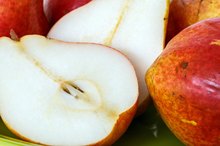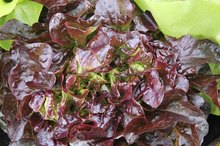10 Healthiest Red Foods
As a rule, the brighter the color of a food, the more concentrated its nutrition. The bright hue of red foods signals lots of nutrition in every bite. Red fruits and vegetables are high in vitamins and minerals, which help turn carbohydrates, fats and proteins into usable energy for the body. These foods also contain antioxidants, which protect DNA from oxidative damage and, therefore, prevent disease. Scientists believe there are still thousands of plant phytochemicals, health-promoting plant substances, that have not been identified. Phytochemicals, including some familiar ones found in red foods--flavonoids, lycopene and resveratrol--have been only partially studied for their health benefits.
Tomatoes
Tomatoes are an all-around superfood. Eaten alone, in salads, or in sauces, they are low-calorie and packed with nutrients. Tomatoes come in a number of shapes, sizes and varieties (and colors). Red tomatoes contain high levels of lycopene, a relative of beta-carotene, which appears to help fight cancers of the esophagus, prostate and stomach. Lycopene is most abundant in cooked tomato products, such as tomato and pizza sauce, and stews, chili and soups. Tomatoes are also rich in potassium, which is important for heart health. In addition, they contain Vitamin C, which helps support skin integrity and immunity.
Red Peppers
The Nutrients in Red Pears
Learn More
Raw, grilled, steamed or sauteed, peppers add flavor and color to dishes. They contain high levels of potassium, which supports digestive and heart health, as well as Vitamin A, which is key for good vision. These red vegetables are popping with Vitamin C, which again, helps wipe out disease-causing bacteria. Hot red peppers contain capsaicin, a phytochemical that may fight bacteria through its most notable property--heat.
Strawberries
Strawberries are low-calorie and loaded with Vitamin C, potassium and folate. The World Dental website says that strawberries may help whiten teeth. The malic acid in strawberries is an effective dental cleaner when mixed with baking soda.
Apples
Red Mango Nutrition
Learn More
Apples are another highly versatile and portable food. They can be baked into pies, mixed into salads, added to yogurt and cereal, or eaten whole. Apples are rich in pectin, a soluble fiber that helps bind LDL cholesterol and send it out of the body. This fruit also contains other heart-healthy substances, such as flavonoids, which are thought to combat free-radical damage to artery walls. Apples come in a number of colors and are all nutritious.
Red Kidney Beans
A red food that does not immediately come to mind but that still deserves a place on the list is kidney beans. They contain not only large amounts of heart-healthy fiber, but zinc, which supports reproductive health and wound healing. Kidney beans also contain B vitamins, which are key for neurological function. Kidney beans, like their legume cousins, also contain potassium and folate.
Watermelon
Like tomatoes, watermelon contains cancer-fighting lycopene. It also contains Vitamin A and plenty of Vitamin C. Watermelon is low calorie and can be eaten as a dessert or blended into a rich, sweet juice. Seedless varieties make it easy to enjoy almost anywhere.
Pomegranates
Pomegranates are delicious and, in recent years, have found their way into supermarkets in a variety of products--everything from the pomegranate fruit itself to pomegranate juice to other pomegranate products. Pomegranates have received attention for their high antioxidant content, but their greatest asset may be their high potassium content.
Cranberries
The tart cranberry is filled with Vitamin C. Today, dried cranberries have joined the ranks of portable snacks and can be purchased as easily as nuts and raisins. Cranberry juice is notable for its high acidity, which can prevent yeast infections in some women.
Raspberries
Fresh raspberries' greatest asset is their high fiber content. Raspberries also contain considerable quantities of potassium, zinc and niacin. Raspberries are under study for certain phytochemicals that may prevent cancer.
Cherries
The deep color of cherries highlights their nutritional content. They contain potassium, calcium and antioxidants. Opt for fresh cherries, however. Avoid the artificially colored sweetened cherries.
Red Food Power
Many whole foods that are red are naturally low-calorie, low-sodium foods. Two other red foods that are healthful, but do not make the "top ten" list due to certain drawbacks, are red wine and lean red meat.
Red wine contains resveratrol, the phytochemical, which appears to be a powerful, heart-healthy antioxidant. The U.S. Department of Agriculture recommends that healthy women limit alcoholic drinks to one a day, and for men, two a day. While wine contains salubrious substances, alcohol in general seems to raise the risk of certain types of cancer, including breast and oral cancers.
Lean red meat is loaded with iron and protein, which make it a great food choice. Red meat intake, however, should be limited, since excessive intake has been linked to colon cancer.
Red foods showcase the nutritional power of a plant-based diet. When choosing red foods, choose those that are whole foods like fruits, vegetables and legumes, and limit red foods that get their red color through dyes and processing. Read the labels of red chips, packaged snack foods, cakes and other foods that appear unnaturally red. Processed red foods are likely to contain potentially harmful substances as well as other undesirable additives, such as fat, sugar and sodium.
Related Articles
References
Writer Bio
Christen Cooper, founder of Cooper Nutrition, provides nutrition education lectures and workshops, nutrition and wellness writing and consulting, and nutrition spokesperson services to a wide variety of clients nationwide. She serves on the editorial board of SuperKidsNutrition.com, a website that offers complete nutrition and fitness information for children and their families. Ms. Cooper earned her master's in nutrition education from Columbia University.









